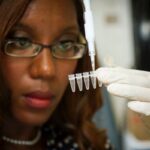As with everything Hidradenitis Suppurativa, this is not a simple answer. Genetics are complicated, and they are not a certainty. Just because you have a predisposition for something does not mean you will get it. Think of it this way. How many relatives have you with a chronic condition that you do not have? This should suggest that not everything that can be passed on is. And not everything that is passed on becomes a reality for you. The same goes for your children. For example, I have HS. I don’t know anyone in my family with HS. So, genetics is more nuanced than I would have if they had it. I want to preface this by saying I am not a geneticist. But here is my understanding.
Genetics and Disease

Firstly, let’s look at some terms that are used in genetics.
Chromosomes are information threads made from protein and DNA. Everyone has two sets of chromosomes, one from each parent. They are located in the nucleus of your cells and carry genes.
Genes decide what traits you will have. And traits are decided by dominant genes. So, if your mom gives you the gene for blonde hair and your father brown and you also have brown, that means your father’s hair colour gene was dominant.
A phenotype is how a trait is expressed (having brown hair). This goes for genetic diseases too. But sometimes, more than one gene decides a trait.
A monogenetic condition is the result of mutations in one gene. Polygenic traits are the result of more than one gene. Scientists think HS results from a polygenetic mutation in a set of genes called on the γ-secretase complex.
What is the Genetic link to HS?
Presenilin is an autosomal dominant gene. This means that only one parent must have the gene to pass it on. And to complicate things further, the gene with a mutation does not have to come from either parent. Autosomal dominant genes can form new mutations, called a de novo change. So, there are two ways scientists think genetics influence your development of HS.
If you are confused, don’t worry. It is complicated. HidraWear have a more comprehensive explanation here. Currently, there are no genetic tests for HS. And scientists don’t think genetics fully explain HS anyway. They think that this explanation only applies to a small amount of people with HS, and more research is needed.
As I said complicated and pretty hard to predict.

A Social Approach to HS
You could say that your genetics suggest a risk to your child of developing HS. There is probably little you can do about that. But as I am sure you know, the disease itself is not the cause of all our problems. When it comes to chronic illness and disability, there is what is called the social model of disability. This model suggests that the environment and not the condition cause many disability issues.
For you and I, our conditions are worsened by the stigma and limitations of our health care. Shame and guilt are significant problems. Some doctors do not have the skills or knowledge to recognise HS. And this means that the disease has often progressed by the time we get help. But these are things you can help your child with.
Advocating for Your Child

I don’t know if your child will have HS. But I do know your child will grow up with someone who lives with HS. They will likely see it or its effects and learn to recognise it. They will grow up without the stigma of having a condition nobody talks about, and everyone hides. If the time comes and they need diagnosis and treatment, they will have a parent who can advocate for them. You will have the knowledge to do that. And I’m guessing if you are reading this, you are well on your way to the confidence to be able to act if the time comes. If you are not already, that is.
No Simple Answers
So, in short, nobody knows. There is a genetic link to HS, but it’s still being investigated. So far, it seems it is not a certainty that because you have HS, your children will too. But that’s good news. I can understand why you might be worried. Many of us had a tough time getting diagnosed. And it was traumatising too. But there’s always more research on the horizon. With that will come quicker diagnosis and better treatment. You will contribute to that.
In the future having HS won’t be the same as it is now. So if your children do have it, they will have more options. They will have knowledge and confidence to be able to act. And they may find out quickly enough to stall its progress. Or maybe, just maybe, there will be a cure.
About the Author

Shannon Sweeney has an MA in Community Research & Journalism from Ireland and works as a multimedia journalist. She is also living with HS and has a keen interest in lifestyle, wellbeing and hidradenitis suppurativa.


